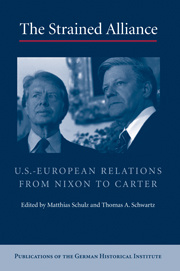The Strained Alliance US-European Relations from Nixon to Carter Publications of the German Historical Institute Series
Langue : Anglais
Auteurs : Schulz Matthias, Schwartz Thomas A.

This collection offers new insights into the changing dynamics of transatlantic relations during the era of détente (1969–1980).
Using a wide array of recently declassified archival materials in the United States and Western Europe, this collection offers new insights into the changing dynamics of transatlantic relations during the era of détente (1969?1980). Whereas prior studies of this decade have focused on the end of the Vietnam War or U.S.-Soviet relations, this volume reveals why bitter conflicts developed between the U.S. and its European allies, and how, contrary to conventional wisdom, European integration evolved less as a consequence of Washington's support than as a result of America's relative decline and growing U.S.-European discord. Taking into account the developments in various bilateral and multilateral settings, such as the European Community, the Helsinki process, and the G-7 summits, the contributions show that a common alliance strategy has always been a difficult undertaking, often the result of bitter confrontation and painful compromises. With clear overtones to more recent disputes, this collection demonstrates there was never a 'golden age' of transatlantic harmony.
Introduction Thomas A. Schwartz and Matthias Schulz; Part I. Disturbing American Leadership? Detente and German Ostpolitik: 1. U.S. detente and German Ostpolitik: parallelisms and frictions Gottfried Niedhart; 2. The Nixon administration and West German Ostpolitik, 1969–1973 Bernd Schaefer; 3. The economics of Ostpolitik: West Germany, the U.S. and the gas pipeline deal Werner Lippert; 4. Odd man out? The CDU/CSU, Ostpolitik, and the Atlantic Alliance Ronald J. Granieri; Part II. A Widening Atlantic?: The 'Relaunching of Europe' and the Collapse of the Transatlantic Monetary Order: 5. The Hague summit of the European Community, Britain's entry, and the 'new' Atlantic partnership, 1969–1970 Claudie Hiepel; 6. Unraveling the ties that really bind: the dissolution of the transatlantic monetary order and the creation of a European exchange rate mechanism, 1965–1973 Hubert Zimmermann; 7. Toward a 'community of stability'? The Deutsche mark between European and Atlantic priorities, 1968–1973 William Gray; 8. The politics of planes and engines: Anglo-American relations during the Rolls Royce-Lockheed crisis Raj Roy; Part III. Reasserting U.S. Leadership? Kissinger's 'Year of Europe' and Beyond: 9. Asserting Europe's distinct identity: the EC nine and Kissinger's 'Year of Europe' Daniel Moeckli; 10. Kissinger's 'Year of Europe', Britain's year of choice Alastair Noble; 11. West Germany's long 'Year of Europe': Bonn between Europe and the United States Fabian Hilfrich; 12. The U.S., Western Europe, and the CSCE, 1972–1975 Sarah B. Snyder; Part IV. Allied Voices, American Choices: The Demise of Detente and the Search for Consensus: 13. The reluctant European: Helmut Schimidt, the European community, and transatlantic relations Mattias Schulz; 14. The quest for leadership in a time of peace: Jimmy Carter and Western Europe, 1977–1981 Joe Renouard and D. Nathan Vigil; 15. The U.S., Europe, and the NATO dual-track decision Joachim Scholtyseck; Part V. Epilogue: the superpower and the union in the making: U.S.-European relations, 1969–1980 Matthias Schulz and Thomas A. Schwartz.
Matthias Schulz is currently Professor of History of International Relations and Transnational History, Département d'histoire générale, Université de Genève, Switzerland. He is the author of Regionalismus und die Gestaltung Europas (1993), Deutschland, der Völkerbund und die Frage der europäischen Wirtschaftsordnung, 1925–1933 (1997), and Normen und Praxis: Das Europäische Konzert als Sicherheitsrat, 1815–1860 (2009).
Thomas A. Schwartz is a Professor of History at Vanderbilt University. He is the author of America's Germany: John J. McCloy and the Federal Republic of Germany (1991) and Lyndon Johnson and Europe: In the Shadow of Vietnam (2003) as well as numerous articles on various aspects of American foreign relations.
Thomas A. Schwartz is a Professor of History at Vanderbilt University. He is the author of America's Germany: John J. McCloy and the Federal Republic of Germany (1991) and Lyndon Johnson and Europe: In the Shadow of Vietnam (2003) as well as numerous articles on various aspects of American foreign relations.
Date de parution : 11-2009
Ouvrage de 398 p.
16x23.5 cm
Thème de The Strained Alliance :
© 2024 LAVOISIER S.A.S.



